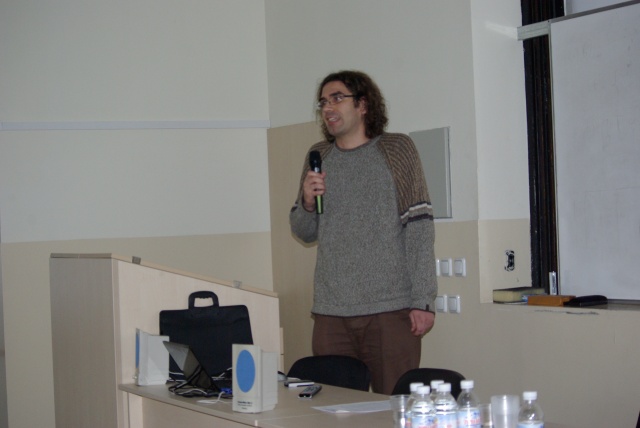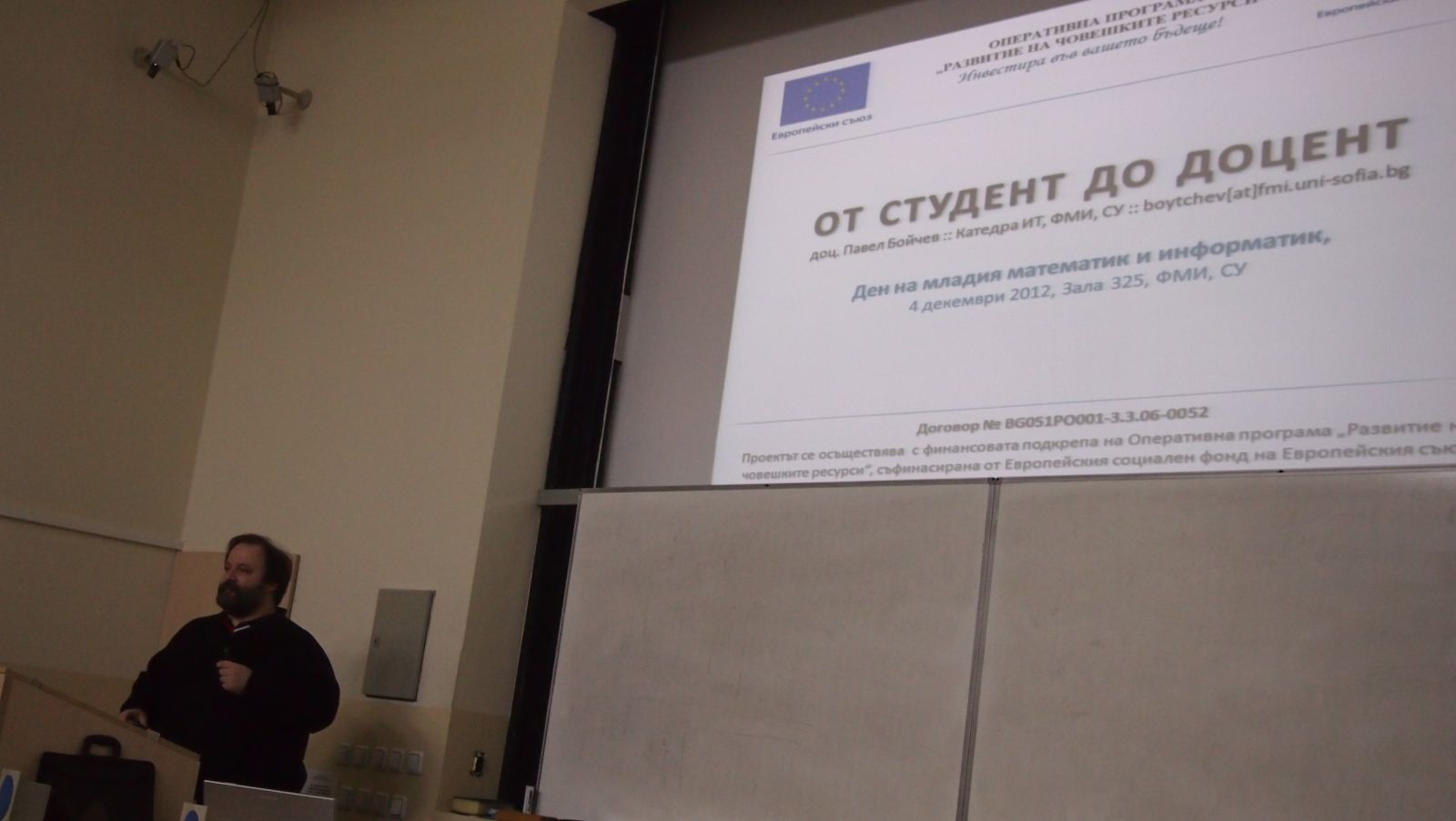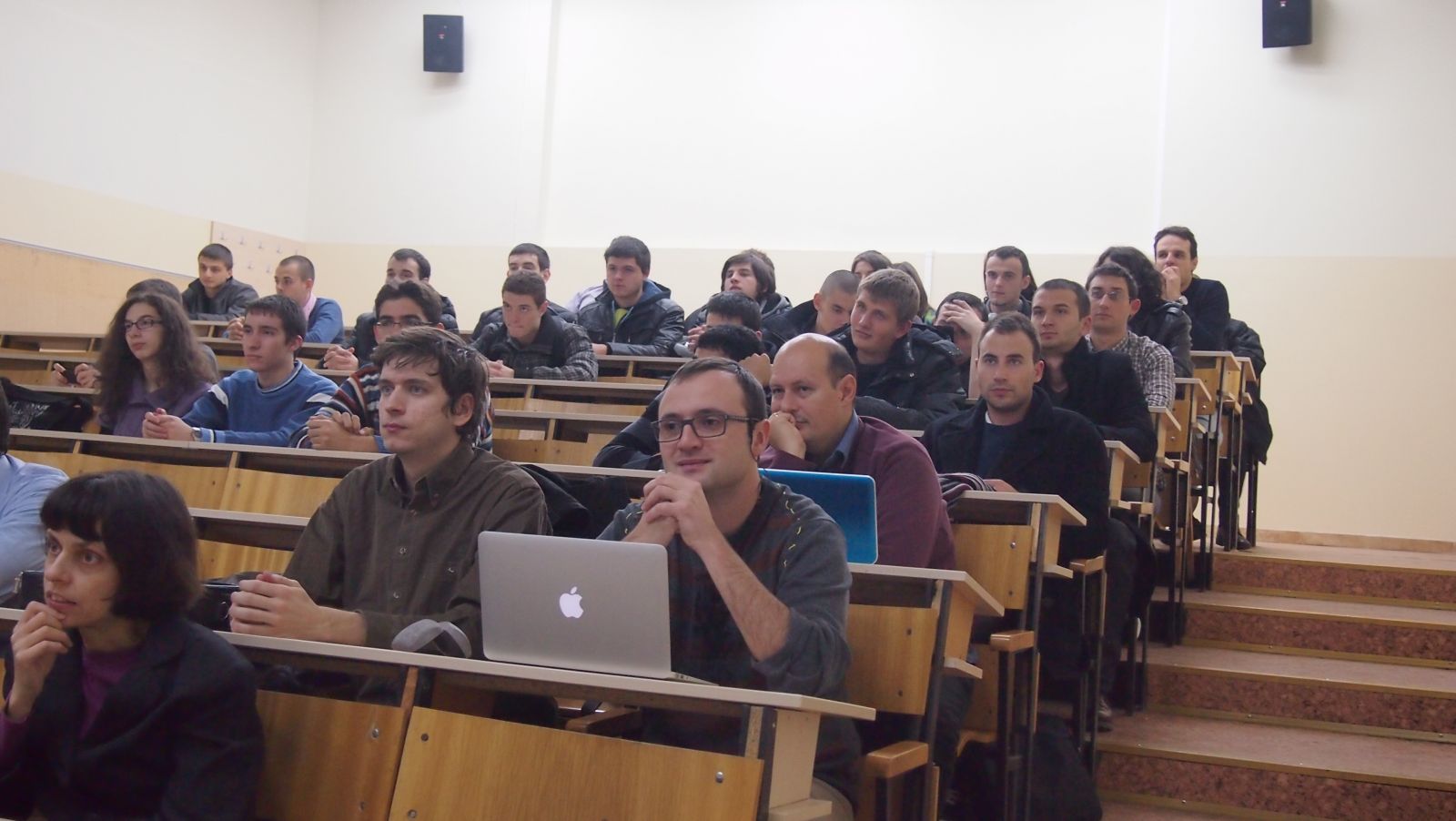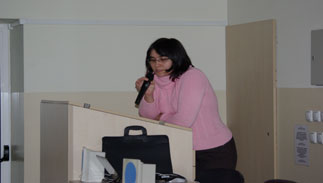 |
 |
 |
 |
18th East-European Conference on
ADVANCES IN DATABASES AND INFORMATION SYSTEMS (ADBIS)
September 7-10, 2014, Ohrid, Republic of Macedonia*
http://adbis2014.finki.ukim.mk/ *the Republic of Macedonia is the constitutional name, while the country was admitted in the UN under the provisional reference of the former Yugoslav Republic of Macedonia
-------------------------------------------------------------
Aims and Scope
--------------------------------------------------------------
ADBIS conferences aim to provide an international forum where researchers and practitioners in the fields of databases and information system, database theory, development of advanced DBMS technologies, and their advanced applications can interact, exchange ideas and disseminate their accomplishments and visions. Inaugurated 18 years ago, ADBIS originally included communities from Central and Eastern Europe, however, throughout its lifetime it has spread and grown to include participants from many other countries throughout the world.
The ADBIS 2014 conference will be held in Ohrid ("European Jerusalem"), September 7-10, 2014 and will continue the tradition by fostering the growth and providing a platform for researchers and practitioners to present their result. Organizer of the conference is FCSE – Faculty of Computer Sciences and Engineering (http://www.finki.ukim.mk) at Ss Cyril and Methodius University in Skopje and ICT-ACT association (http://www.ict-act.org). The conference will consist of regular sessions with technical contributions (regular papers, short papers) reviewed and selected by an international program committee, as well as of invited talks and tutorials presented by leading scientists. The official language of the conference will be English. Doctoral consortium and different workshops will be held in line with the main conference.
--------------------------------------------------------------
Important Dates
--------------------------------------------------------------
Main conference
----------------------
Paper submissions: Mar. 30, 2014
Acceptance: May 18, 2014
Camera-ready: Jun. 15, 2014
Conference: Sep. 7-10, 2014
Workshop, panels, tutorials
---------------------------------
Proposal submissions: Jan. 26, 2014 (closes deadline) https://research.cs.wisc.edu/dbworld/messages/2013-12/1388102109.html
Acceptance: Jan. 31, 2014
Camera-ready: Jun. 15, 2014
Workshops: Sep. 07, 2014
PhD Consortium
---------------------
Application submiss.: Mar. 30, 2014
http://adbis2014.finki.ukim.mk/for-authors/call-for-phd-consortium/
Acceptance: May 18, 2014
Camera-ready: Jun. 15, 2014
PhD Consortium: Sep. 07, 2014
- Management of large scale data systems
- Benchmarking and experimental methodology
- Big data storage, replication and consistency
- Business process modelling and optimization
- Complex event processing and messaging analytics
- Database monitoring and (self-)tuning
- Data curation, annotation, and provenance
- Clouds and virtualization
- Data processing in social networks
- Data quality and data cleansing
- Data models and query languages
- Data structures and indexing
- Data mining and knowledge discovery
- Data warehousing
- Information extraction and integration
- Databases on emerging hardware architectures
- Scalable data analysis
- Meta-data management
- Data privacy and security
- Query and data-flow processing and optimization
- Complex queries and key search
- Probabilistic databases, uncertainty and approximate querying
- Service based information systems
- Sensor databases and mobile data management
- Social networks and streaming data analysis
- User Interfaces and data visualization
- Data intensive sciences and databases
- Theoretical foundations of databases
- Multi-media, temporal and spatial databases
- Information extraction from unstructured databases
- Web, XML and semi-structured databases
- Map/reduce architectures and multi-data model support
- Innovative platforms and novel applications
- Information system architecture, networking, integrity and security
- Compliant and rule based IS
- Context-aware and adaptive IS
--------------------------------------------------------------
Paper Publishing and Awards
--------------------------------------------------------------
ADBIS research papers will be published in a Springer-Verlag LNCS volume. Papers must not exceed 14 pages in the LNCS format (Latex or MS Word styles for camera-ready papers).
The program committee may decide to accept a submission as a short paper if it reports interesting results but does not justify publication of a full paper. It will be published by Springer-Verlag in the Advances in Intelligent Systems and Computing series and must not exceed 12 pages.
The authors of the best papers will be invited to prepare extended versions of their papers after the conference. The extended papers, after an additional round of review, will appear in an international journal.
The best paper authored solely by students will receive an award. Submissions should indicate their eligibility for the award.
--------------------------------------------------------------
Submission Guidelines
--------------------------------------------------------------
Each submitted work must adhere to the following rules regarding the respective paper:
- Papers must be written in English
- Papers must contain previously unpublished work and not be submitted concurrently or under review for another conference.
- Each paper must be submitted as a single PDF document, via the Easychair system: https://www.easychair.org/account/signin.cgi?conf=adbis2014
- For every accepted paper to be included in the Proceedings at least one of the co-authors should be registered for the conference.
- Accepted papers must be presented at the conference by one of the authors.
--------------------------------------------------------------
ADBIS Steering Committee
--------------------------------------------------------------
Chair of the Steering Committee
-------------------------------
Leonid Kalinichenko, Russian Academy of Science, Russia
Members of the Steering Committee:
----------------------------------
- Paolo Atzeni, Italy
- Andras Benczur, Hungary
- Albertas Caplinskas, Lithuania
- Barbara Catania, Italy
- Johann Eder, Austria
- Theo Haerder, Germany
- Marite Kirikova, Latvia
- Hele-Mai Haav, Estonia
- Mirjana Ivanovic, Serbia
- Hannu Jaakkola, Finland
- Mikhail Kogalovsky, Russia
- Yannis Manolopoulos, Greece
- Rainer Manthey, Germany
- Manuk Manukyan, Armenia
- Joris Mihaeli, Israel
- Tadeusz Morzy, Poland
- Pavol Navrat, Slovakia
- Boris Novikov, Russia
- Mykola Nikitchenko, Ukraine
- Jaroslav Pokornyv, Czech Republic
- Boris Rachev, Bulgaria
- Bernhard Thalheim, Germany
- Gottfried Vossen, Germany
- Tatjana Welzer, Slovenia
- Viacheslav Wolfengagen, Russia
- Robert Wrembler, Poland
- Ester Zumpano, Italy
--------------------------------------------------------------
ADBIS 2014 Conference Organization
--------------------------------------------------------------
General Chair
-------------
- Margita Kon-Popovska, Ss Cyril and Methodious University in Skopje
Program Committee Co-Chairs
---------------------------
- Yannis Manolopoulos, Aristotle University of Thessaloniki
- Goce Trajcevski, Northwestern University IL
Workshop Co-Chairs
------------------
- Themis Palpanas, University of Paris V - Paris Descartes
University of Trento
- Athena Vakali, Aristotle University of Thessaloniki
PhD Consortium Co-Chairs
------------------------
- Nick Bassiliades, Aristotle University of Thessaloniki
- Mirjana Ivanovic, University of Novi Sad
Publicity Chair
--------------
- Goran Velinov, Ss Cyril and Methodious University in Skopje
Website Chair
-------------
- Vangel Ajanovski, Ss Cyril and Methodious University in Skopje
Local Organizing Committee Chair
--------------------------------
- Goran Velinov, Ss Cyril and Methodious University in Skopje
Local Organizing Committee
--------------------------
- Anastas Mishev, Ss Cyril and Methodious University in Skopje
- Boro Jakimovski, Ss Cyril and Methodious University in Skopje
- Ivan Chorbev, Ss Cyril and Methodious University in Skopje
--------------------------------------------------------------
Program Committee
--------------------------------------------------------------
Marko Bajec – University of Ljubljana, Slovenia
Mirta Baranovic – University of Zagreb, Croatia
Guntis Barzdins – University of Latvia, Latvia
Andreas Behrend – University of Bonn, Germany
Ladjel Bellatreche – Ecole Nationale Supérieure de Mécanique et d'Aérotechnique, France
Maria Bielikova – Slovak University of Technology in Bratislava, Slovakia
Iovka Boneva – University Lille 1, France
Omar Boucelma – LSIS, Aix-Marseille University, France
Stephane Bressan – National University of Singapore, Singapore
Davide Buscaldi – LIPN, Université Paris 13, France
Albertas Caplinskas – Vilnius University, Lithuania
Barbara Catania – University of Genoa, Italy
Wojciech Cellary – Poznan University of Economics, Poland
Richard Chbeir – Université de Pau et des Pays de l'Adour, France
Ricardo Ciferri – Federal University of São Carlos, Brasil
Alfredo Cuzzocrea University of Calabria, Italy
Danco Davcev – University Ss Cyril and Methodius in Skopje, Macedonia
Vladimir Dimitrov - Sofia University, Bulgaria
Eduard Dragut – Temple University, USA
Schahram Dustdar – Vienna University of Technology, Austria
Todd Eavis – Concordia University, Canada
Johann Eder – University of Klagenfurt, Austria
Tobias Emrich – Ludwig-Maximilians-Universität München, Germany
Victor Felea – University Alexandru Ioan Cusa, Iasi, Romania
Pedro Furtado – University of Coimbra, Portugal
Zdravko Galic – University of Zagreb, Croatia
Johann Gamper – Free University of Bozen-Bolzano, Italy
Minos Garofalakis – Technical University of Crete, Greece
Jan Genci – Technical University of Kosice, Slovakia
Matteo Golfarelli – University of Bologna, Italy
Katarina Grigorova - Ruse University, Bulgaria
Giovanna Guerrini – University of Genova, Italy
Ralf Hartmut Güting – Fernuniversität Hagen, Germany
Theo Härder – Tehnical University Kaiserslautern, Germany
Stephen Hegner – Umeå University, Sweden
Ali Inan – Isik University, Turkey
Mirjana Ivanovic – University of Novi Sad, Serbia
Hannu Jaakkola – Tampere University of Technology, Finland
Manfred Jeusfeld – Tilburg University, Netherlands
Slobodan Kalajdziski – University Ss Cyril and Methodius in Skopje, Macedonia
Leonid Kalinichenko – Russian Academy of Science, Russia
Kalinka Kaloyanova – Sofia University St. Kliment Ohridski, Bulgaria
Mehmed Kantardzic – University of Louisville, USA
Marite Kirikova – Riga Technical University, Latvia
Harald Kosch – University of Passau, Germany
Georgia Koutrika – HP Labs, USA
Andrea Kulakov – University Ss Cyril and Methodius in Skopje, Macedonia
Lars Kulik – The University of Melbourne, Australia
Wolfgang Lehner – Technical University Dresden, Germany
Jan Lindström – IBM Helsinki, Finland
Ivan Luković – University of Novi Sad, Serbia
Federica Mandreoli – University of Modena, Italy
Rainer Manthey – University of Bonn, Germany
Manuk Manukyan – Yerevan State University, Armenia
Giansalvatore Mecca – University Basilicata, Italy
Marco Mesiti – University of Milano, Italy
Irena Mlynkova – Charles University in Prague, Czech Republic
Alexandros Nanopoulos – University of Hildesheim, Germany
Pavol Navrat – Slovak University of Technology, Slovakia
Daniel C. Neagu – University of Bradford, UK
Anisoara Nica – SAP, Canada
Nikolaj Nikitchenko – Kiev State University, Ukraine
Kjetil Nørvåg – Norwegian University of Science and Technology, Norwey
Boris Novikov – University of St.Petersburg, Russia
Gultekin Ozsoyoglu – Case Western Reserve University, USA
Euthimios Panagos – Applied Communication Sciences, USA
Gordana Pavlovic-Lazetic – University of Belgrade, Serbia
Torben Bach Pedersen – Aalborg University, Denmark
Dana Petcu – West University of Timisoara, Romania
Evaggelia Pitoura – University of Ioannina, Greece
Elisa Quintarelli – Politecnico di Milano, Italy
Paolo Rosso – Polytechnic University Valencia, Spain
Viera Rozinajova – Slovak University of Technology, Slovakia
Ismael Sanz – Universitat Jaume I, Spain
Klaus-Dieter Schewe – Software Competence Center, Austria
Marc H. Scholl – University of Konstanz, Germany
Holger Schwarz – Universität Stuttgart, Germany
Timos Sellis – National Technical University of Athen, Greece
Predrag Stanisic, University of Montenegro, Montenegro
Bela Stantic – Griffith University, Australia
Yannis Stavrakas – Institute for the Management of Information Systems, Greece
Krzysztof Stencel – University of Warsaw, Poland
Leonid Stoimenov – University of Nis, Serbia
Panagiotis Symeonidis – Aristotle University of Thessaloniki, Greece
Amirreza Tahamtan – Vienna University of Technology, Austria
Ernest Teniente – Unversitat Politècnica de Catalunya, Spain
Manolis Terrovitis – Institute for the Management of Information Systems, Greece
Bernhard Thalheim – Christian Albrechts University Kiel, Germany
A Min Tjoa – Vienna University of Technology, Austria
Ismail Toroslu – Middle East Technical University, Turkey
Juan Trujillo – University of Alicante, Spain
Traian Marius Truta – Northern Kentucky University, USA
Ozgur Ulusoy – Bilkent University, Turkey
Maurice Van Keulen – University of Twente, Netherlands
Olegas Vasilecas – Vilnius Gediminas Technical University, Lithuania
Panos Vassiliadis – University of Ioannina, Greece
Jari Veijalainen – University of Jyvaskyla, Finland
Goran Velinov – University Ss Cyril and Methodius in Skopje, Macedonia
Gottfried Vossen – Universität Münster, Germany
Boris Vrdoljak – University of Zagreb, Croatia
Fan Wang – Microsoft, USA
Gerhard Weikum – Max Planck Institute for Informatics, Germany
Tatjana Welzer – University of Maribor, Slovenia
Marek Wojciechowski – Poznan University of Technology, Poland
Robert Wrembel – Poznan Unviersity of Technology, Poland
Vladimir Zadorozhny – University of Pittsburgh, USA
Jaroslav Zendulka – Brno University of Technology, Czech Republic
Andreas Zuefle – Ludwig-Maximilians-Universität München, Germany
--------------------------------------------------------------
Conference Location
--------------------------------------------------------------
Ohrid (http://www.ohrid.com.mk) is a city in the Republic of Macedonia (the Republic of Macedonia is the constitutional name, while the country was admitted in the UN under the provisional reference of the former Yugoslav Republic of Macedonia). Ohrid is the largest city on Lake Ohrid at an elevation of 690m above the sea level. It is located 160 km south-west from the capital Skopje, and 80 km from the border with Greece. Nowadays predominantly tourist and congress town, Ohrid is sometimes called Jerusalem of the Balkans and has a notable legend for once having had 365 churches, one for each day of the year. The city is rich in picturesque houses and monuments. In 1979 and 1980, Ohrid and Lake Ohrid were accepted as Cultural and Natural World Heritage Sites by UNESCO (http://whc.unesco.org/en/list/99). In fact, Ohrid is one of only 28 sites that are part of UNESCO's World Heritage that are both Cultural and Natural sites. The shores of Lake Ohrid have been inhabited since prehistoric times (archaeologists speak of settlements from the Neolithic period – 6.000 years B.C. the Iron age (golden funeral masks from VI and V century BC). From the Hellenic and Roman period the settlement is known as Lychnidos (meaning Light giving), located along the Via Egnatia, at the times during which, among others, the amphitheatre in II century BC was built. Archaeological excavations demonstrate rather early adoption of Christianity, and establishment of Lychnidos Episcopacy, while medieval period adds signs of numerous Balkan rulers. Lake Ohrid, with mountain peaks of over 2.000m besides it's shores, is one of Europe's deepest and oldest lakes, preserving a unique aquatic ecosystem that is of worldwide importance, with more than 200 endemic species.
--------------------------------------------------------------
Conference Venue
--------------------------------------------------------------
The conference will take place at the Metropol Lake Resort, a complex of three hotels (Metropol, Bellevue and Tourist) located 6 km south of Ohrid. Pre-reservation of rooms for ADBIS 2014 participants were made at the resort. Besides access to the beach, the Metropol resort hotels offer many possibilities for outdoor activities (swimming pools, tennis and basketball courts). More information: http://www.metropol-ohrid.com.mk
 | Проект BG051PO001-3.3.06-0052 „Формиране на нова генерация от изследователи в областта на математиката, информатиката и компютърните науки чрез подкрепа на творческия и иновативен потенциал на докторанти, постдокторанти и млади учени във ФМИ на СУ”
|  |